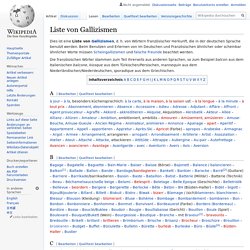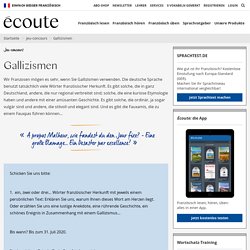

55 bildungssprachliche Begriffe aus dem Französischen. Sprichst du Französisch?

Macht nichts, ich auch nicht. Bildungssprachliche Begriffe sind nicht nur aus dem Lateinischen zu uns gekommen, sondern auch aus anderen Sprachen. Französische war einst mal das, was heute das Englische ist, nämlich allgegenwärtig. Davon ist noch allerlei übrig. Siehe auch hier: 99 wohlklingende Französische Wörter im Deutschen – Mehr Raffinesse für deinen Text. Apropos ... kennst du schon mein Buch? Regenschirmmann versus Studentin … Neu! An dieser Stelle geht es um den Einsatz des Französischen in der Bildungssprache.
Liste bildungssprachlicher Wörter und Phrasen aus dem Französischen, die in der deutschen Sprache verwendet werden Diese Wörter tauchen immer mal wieder im bildungssprachlichen Kontext auf. 99 wohlklingende Französische Wörter im Deutschen. Liste von Gallizismen. Dies ist eine Liste von Gallizismen, d. h. von Wörtern französischer Herkunft, die in der deutschen Sprache benutzt werden.

Écoute Online. Wir Franzosen mögen es sehr, wenn Sie Gallizismen verwenden.

Die deutsche Sprache benutzt tatsächlich viele Wörter französischer Herkunft. Es gibt solche, die in ganz Deutschland, andere, die nur regional verbreitet sind; solche, die eine kuriose Etymologie haben und andere mit einer amüsanten Geschichte. WALS Online - Wörter französischen Ursprungs. Wolfgang Hamm: "Meine Großmutter war vielleicht sogar ne vornehme Frau, jedenfalls dachte ich als Kind, dass sie sehr vornehm wäre, weil sie hatte so merkwürdige französische Ausdrücke, die ich gar nicht verstand.

Zum Beispiel konnte die sagen Chaiselongue, und damit war ein ganz normales Sofa gemeint. Natürlich sprach sie immer von Trottoir oder auf der Chaussée, das war die Straße. Oder so Ausdrücke wie Plafond. 16 Scary Sayings for 'Ghost' From Across the United States. On Halloween, the spirits of the dead are supposed to walk the earth with the living.

Whether or not you believe that, or in ghosts in general, you might want to know what you’re getting into if you hear a South Carolina native mention a plat-eye or a Maine resident warn you about swogons. Le double-sens : le fléau de l'existence d'un traducteur. La langue est la manière par laquelle nous comprenons tout ce qui se passe autour de nous.

C’est un ensemble de symboles qui représente les réalités d’une société et de sa culture. Elle est dynamique, et selon la société, la région, ou le pays, il y a toujours des différences, subtiles ou non dans la manière de s’exprimer. Elle est donc un produit de la société où elle se développe et diffère d’un pays à l’autre. Le problème, c’est que dans la traduction d’une langue à une autre, il n’est pas toujours possible qu’un mot soit traduit de façon exacte pour donner la même signification que dans la langue source. Et donc voilà, le problème qui n’aura jamais de solution : le double-sens dans une traduction. Qu’est-ce que le double-sens ? On parle de double-sens quand un mot ou une phrase peut avoir des interprétations différentes. Le double-sens non intentionnel Parfois dans la traduction, on se retrouve avec un texte qui contient un double-sens non intentionnel.
Le double-sens intentionnel. Obvs is Phonological, and it's Totes Legit — Language Jones. Recently, NPR ran a story called Researchers are Totes Studying how Ppl Shorten Words on Twitter.

It was primarily focused on what they called 'clipping,' for which the author of the article provides the example "awks," for "awkward. " As far as I know, aside from the researchers interviewed by NPR, no one has done any scholarly work on this phenomenon, and as far as I can find on JSTOR and Google Scholar, no one has published anything on it. The general consensus among regular folk is that the phenomenon is: annoyingassociated with young white womenthe result of character limits on Twitter, or choices about spelling economy in text messages.
Totes. « previous post | next post » Back in March, Lauren Spradlin gave a wonderful talk at PLC 39, under the title "OMG the Word-Final Alveopalatals are Cray-Cray Prev: A Morphophonological Account of Totes Constructions in English".

It's been on my to-blog list ever since. How Icy Greenland Got Its Name (Video) How to Read a French Menu (Video) Warranty vs. Guarantee. A warranty is a guarantee of the integrity of a product and of the maker’s responsibility for it.

In a sense, guarantee is the more general term and warranty is the more specific (that is, written and legal) term. But a closer look at these words shows a relationship that is even closer than that: they were originally one and the same. The root of both words is the Old French word garantie, which comes from the verb garantir, meaning “to protect,” “to warrant,” or “to guarantee.”
Unlike most words in French, which descend directly from Latin, this word has roots in the Germanic language spoken by the Franks called Old Low Franconian (an ancestor of modern Dutch). Cooper - Last Names That Come From Jobs. Totes Constructions: Linguist Lauren Spradlin Reveals How We Totes Abbreve. As a linguist I can attest to how rewarding it is to be the first to research a topic, and how ridic fun it is for my barely-concealed inner nerd to describe internet speech and slang with formal terminology.

Lauren Spradlin, a graduate student at CUNY, managed to do both at once in her analysis of totes constructions, or totesing, that has gained prominence lately in speech and writing. Let’s just say that I’m jelly. Here’s what she discovered. First, how do we totes? Veille CFTTR. Do you speak banana? Presque six ans après la sortie de Moi, Moche et Méchant (2010), la folie des “minions” a toujours cours. Que ce soit sur les fils d’actualité Facebook ou parmi les jouets de vos enfants, ils se sont glissés partout, dans le cœur des enfants comme des adultes. The New Meaning of 'Bandwidth' Some technical words manage to break free of their semantic bounds, take on figurative meanings, and flourish in the general language. Telescope began as a kind of optical instrument, but over time has taken on additional meanings, including the verb sense meaning “to compress or condense.
" Other technical terms, such as electrocardiograph, have unfortunately failed to break out into any wider figurative use. One word with a burgeoning second sense is bandwidth. Bandwidth is more similar to telescope than to electrocardiograph; it entered our language allied closely with science and technology, but which is gradually branching out into non-specialized use. Malaprop (Video) English Words from French: The Norman Conquest (Video) Dutch courage? Effects of acute alcohol consumption on self-ratings and observer ratings of foreign language skillsJournal of Psychopharmacology - Fritz Renner, Inge Kersbergen, Matt Field, Jessica Werthmann, 2017. Babbel. Illustration from Raúl Soria “Geez Louise! " said no one recently. “Jiminy Cricket! " said my 90-year-old grandmother last week. Every language has its share of outmoded words and expressions; old-timey phrases that were once “da bomb," and are now totally “old hat.
" In today’s fast-paced, youth-obsessed culture, it seems the shelf-life for words only gets shorter. But snarky teenagers, take note: One day, you too will grapple with obsolescence, the words you know and love evoking in a younger generation feelings of “ugghhh" and “ruhhhh"; on this day, what was once so cool will suddenly be so… I don’t know… soooo text message (In the future, text messages will be an anachronism, as computers will connect directly to your brain, transmitting unimaginably exciting images to your message partner. 1. We’ve all been there — you’re talking to someone about something really interesting, making a super clever point, when suddenly your speaking partner starts rubbing your belly.
Wait… what?! 2. Les intraduisibles de la langue française. La prononciation authentique en langue étrangère : un problème négligé. Pourquoi certains noms de pays sont-ils masculins et d'autres féminins? Nous nous sommes rendus coupables de faute d'orthographe (1) il y a quelques semaines en mettant l'Iran au féminin. Vous nous avez corrigés (2) et grâce à vous nous nous sommes demandé (3): pourquoi l'Iran serait-il de genre masculin? Et pourquoi d'autres pays sont-ils féminins? Les noms féminins. 25 Words That Are Their Own Opposites. Veille CFTTR. Tout d’abord, il est important de rappeler qu’aucune forme d’argot ne peut rivaliser avec l’impératrice de celle-ci : le verlan franco-français, que le dubitatif écoute de la bouche de Fabrice Lucchini dans Tout peut arriver. Et voilà pourquoi l’allemand met le verbe à la fin - Le Temps.
Here’s What Happens in Your Brain When You Hear a Pun. Why do spiders make great baseball players? Because they know how to catch flies. Sorry, sorry, I know that was bad. And that puns, in general, are among the most despised forms of humor. But pun-haters, bear with me — there’s a reason I made you suffer through the last couple sentences: In the split second between when you read the pun and when you rolled your eyes, something pretty cool was happening in your brain.
As writer Roni Jacobson explained in a recent Scientific American column, new research published earlier this year in the journal Laterality: Asymmetries of Body, Brain and Cognition, sheds some light on how our minds process the complexities of wordplay. Remarkable increase in number of Basque speakers, new survey data reveal.
There have never been so many bilingual speakers in the Basque country. This is one of the key findings of the latest 6th Sociolinguistic Survey [VI Encuesta Sociolingüistica] published recently by the Government of the Basque country. According to the latest figures presented (2016), 33,9% of the population in the Basque Country over 16 y.o claim to be Basque speakers (631,000 people), 19,1% (356,000) claim to be passive speakers, that is, they understand it but they do not speak it fluently, and the remaining 47% (877,000) do not speak or understand Basque. “These are remarkable figures if we consider that today, there are 212,000 more fluent speakers of Basque than in 1991” – stated Patxi Baztarrika, Vice-minister for Language Policy at the Basque Country and Chair of NPLD, referring to the data presented.
Slash: Not Just a Punctuation Mark Anymore – Lingua Franca - Blogs - The Chronicle of Higher Education. In the undergraduate history of English course I am teaching this term, I request/require that the students teach me two new slang words every day before I begin class. I learn some great words this way (e.g., hangry “cranky or angry due to feeling hungry”; adorkable “adorable in a dorky way”). More importantly, the activity reinforces for students a key message of the course: that the history of English is happening all around us (and that slang is humans’ linguistic creativity at work, not linguistic corruption). Two weeks ago, one student brought up the word slash as an example of new slang, and it quickly became clear to me that many students are using slash in ways unfamiliar to me.
English language weird rules: Tweet reveals our bizarre way of speaking. This single tweet proves just how bizarre the English language is. I’M NOT racist, but English is a bloody ridiculous language. Just about anybody who has studied a second language can attest to that. You learn basic French or Italian, with its verbal structure and its constant rules, and find yourself realising just how sadistic and merciless our Anglo-Saxon forefathers must have been to make so many exceptions. Ces mots qui résistent à la traduction - BABEL OUEB. © Maptia.com « Les mots ne sont que des symboles pour les relations des choses entre elles et avec nous, ils ne touchent jamais à la vérité absolue »Friedrich Nietzsche dans La Philosophie à l'époque tragique des Grecs. Si le langage restera toujours incomplet, contraint par son l'ambition de décrire le monde à l'impossibilité d'en saisir toute son infinie densité, certaines langues possèdent des mots, des termes, qui témoignent d'une sensibilité particulière et enrichissent notre rapport au monde...
Le site Maptia.com a admirablement illustré 11 termes intraduisibles issus d'autres cultures, à découvrir et à apprendre pour ensuite les distiller à l'envie dans notre langage courant. Linguisten.de — languageek: The Speed of Language - Found on... The Professor Who Declared, It's J.K. Rowling - Technology. Patrick Juola has practiced stylometry, the science of linguistic style, for decades. But he was never famous for it until this month, when he helped unmask the world's best-known living author. Mr. What is language extinction and why should we care? How Studying or Working Abroad Makes You Smarter. Creating names with emotional appeal. Words We're Watching: -Zilla.
The Lingua File: The Wide World of English Demonyms. 10 fautes d'orthographe courantes que vous ne ferez plus.